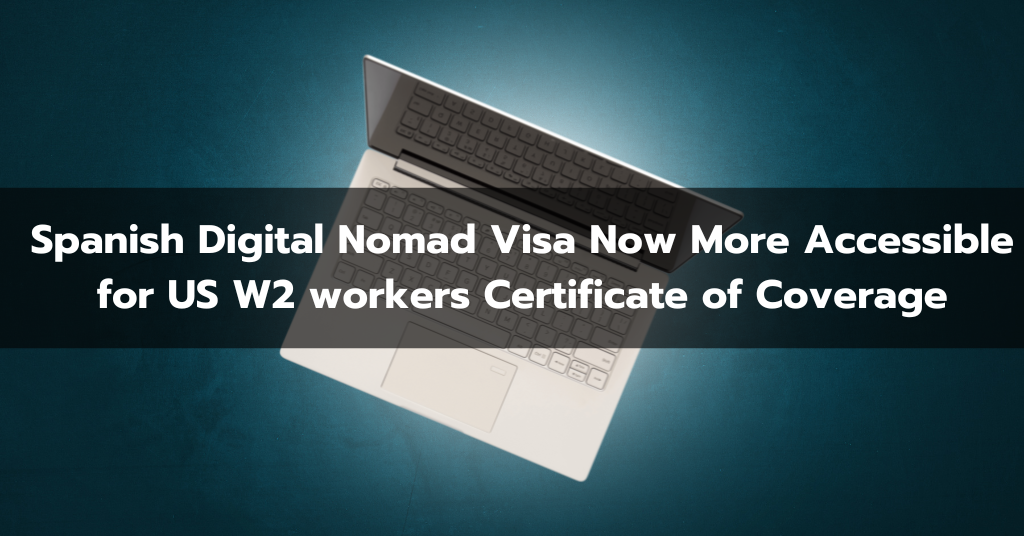
If you’re a U.S. employee working remotely and dreaming of relocating to Spain, there’s encouraging news: recent administrative changes are making it significantly easier for U.S. W2 workers to qualify for Spain’s Digital Nomad Visa (DNV).
Thanks to updates in how U.S. Social Security Certificates of Coverage (CoCs) are issued—and how Spanish immigration authorities interpret them—many American employees may now meet a key requirement for the DNV without needing to register for Spanish social security contributions.
In this article, we’ll break down what’s changed, who it benefits, and how to prepare a strong application.
Understanding the Digital Nomad Visa (DNV)
Spain’s Digital Nomad Visa was introduced to attract international remote workers through its Startup Law. The visa allows non-EU citizens to live and work remotely in Spain, initially for three years (when applying from Spain), with the possibility to renew for another two.
To qualify, applicants must meet several criteria, including:
-
A stable remote job or business outside Spain
-
Minimum income of approximately €2,763/month (as of 2025) for the main applicant
-
Private health insurance (when there’s no CoC and no autónomo enrollment) or access to the Public healthcare system
-
Clean criminal record
-
Fulfillment of social security obligations, either by pledging to register in Spain or presenting a valid Certificate of Coverage from their home country
What Has Changed for U.S. Applicants?
Previously, obtaining a Certificate of Coverage from the U.S. was nearly impossible for remote workers unless they were sent abroad by a U.S. company with operations in Spain. That barrier has now started to shift.
Starting in July 2025, we have observed that the Spanish authorities are now accepting CoCs listing a residential address in Spain, rather than requiring the name of a Spanish company. This opens the door for W2 employees (those on payroll in the U.S.) to potentially avoid paying into Spanish social security—provided they continue contributing to U.S. Social Security.
This adjustment greatly simplifies things for Americans who want to work remotely from Spain while remaining on their U.S. employer’s payroll.
Can Self-Employed Individuals Benefit Too?
The answer is: not easily.
For self-employed individuals or small business owners (such as those operating through LLCs or S-corporations), securing a U.S. Certificate of Coverage is significantly more complicated. To qualify, your business operations must be demonstrably U.S.-based, and even then, acceptance by Spanish authorities is less consistent.
In practice, very few self-employed Americans receive approval using a U.S. CoC. Most instead apply by pledging to register with Spain’s social security system (RETA) once the DNV is approved.
What About Business Owners on Payroll?
If you own a business but pay yourself as an employee, things can get tricky.
Under Spanish administrative criteria, those who own 25% or more of a business are generally classified as self-employed, regardless of their title or payroll status. Applying as an employee in these cases may be flagged as noncompliant, leading to rejection or further scrutiny.
If you are in this situation, professional legal advice is strongly recommended before proceeding with a DNV application.
How to Apply for a Certificate of Coverage (W2 Employees)
If you are a W2 employee, your U.S.-based employer can request a CoC from the Social Security Administration (SSA) by providing:
-
Your name, SSN, and Spanish address
-
Employer’s name, U.S. address, and EIN
-
Employment confirmation stating that you’ll be working remotely from Spain (duration usually not exceeding five years)
The process usually takes 4–8 weeks, and it’s important to begin early to avoid delays in your DNV application.
Once issued, this certificate proves that you’re already covered by U.S. social security, thereby exempting you (temporarily) from registering with Spanish social security under the bilateral agreement.
Important Notes for Digital Nomads
-
Income Taxes Still Apply: Even with a CoC, you may become a Spanish tax resident after 183 days, unless you qualify for the Beckham Law, which provides a favorable flat 24% tax rate.
-
Work Must Be International: The DNV requires that your clients or employer are primarily based outside Spain, with a maximum of 20% Spanish-sourced income allowed.
-
Document Accuracy Is Critical: All supporting documents—including the CoC—must be complete, clearly worded, and consistent with the visa application file.
What If You Can’t Get a CoC?
If a CoC isn’t an option (e.g., for business owners or freelancers), the next best step is applying under the self-employed route, pledging to join the Spanish social security system (RETA) upon visa approval. This involves additional costs and formalities but remains a valid and successful path.
How We Help at Sterna Abogados
At Sterna Abogados, we specialize in helping U.S. digital nomads and remote workers navigate the legal and administrative requirements of moving to Spain. Our team:
-
Prepares your full visa application package
-
Verifies eligibility for Certificates of Coverage
-
Advises on tax and social security implications
-
Drafts necessary declarations and legal documentation
-
Provides strategic support for entrepreneurs and business owners
Final Thoughts: A Promising Shift for U.S. Digital Nomads
Spain’s Digital Nomad Visa continues to evolve—and for U.S. W2 employees, it’s now more accessible than ever. The acceptance of CoCs listing residential addresses in Spain is a clear sign that remote work is being more widely accommodated within international agreements.
While navigating the rules can be complex, with the right guidance and preparation, living and working legally in Spain is within reach.
For expert assistance with your Digital Nomad Visa or to check if you qualify for a Certificate of Coverage, contact us at info@sternaabogados.com.